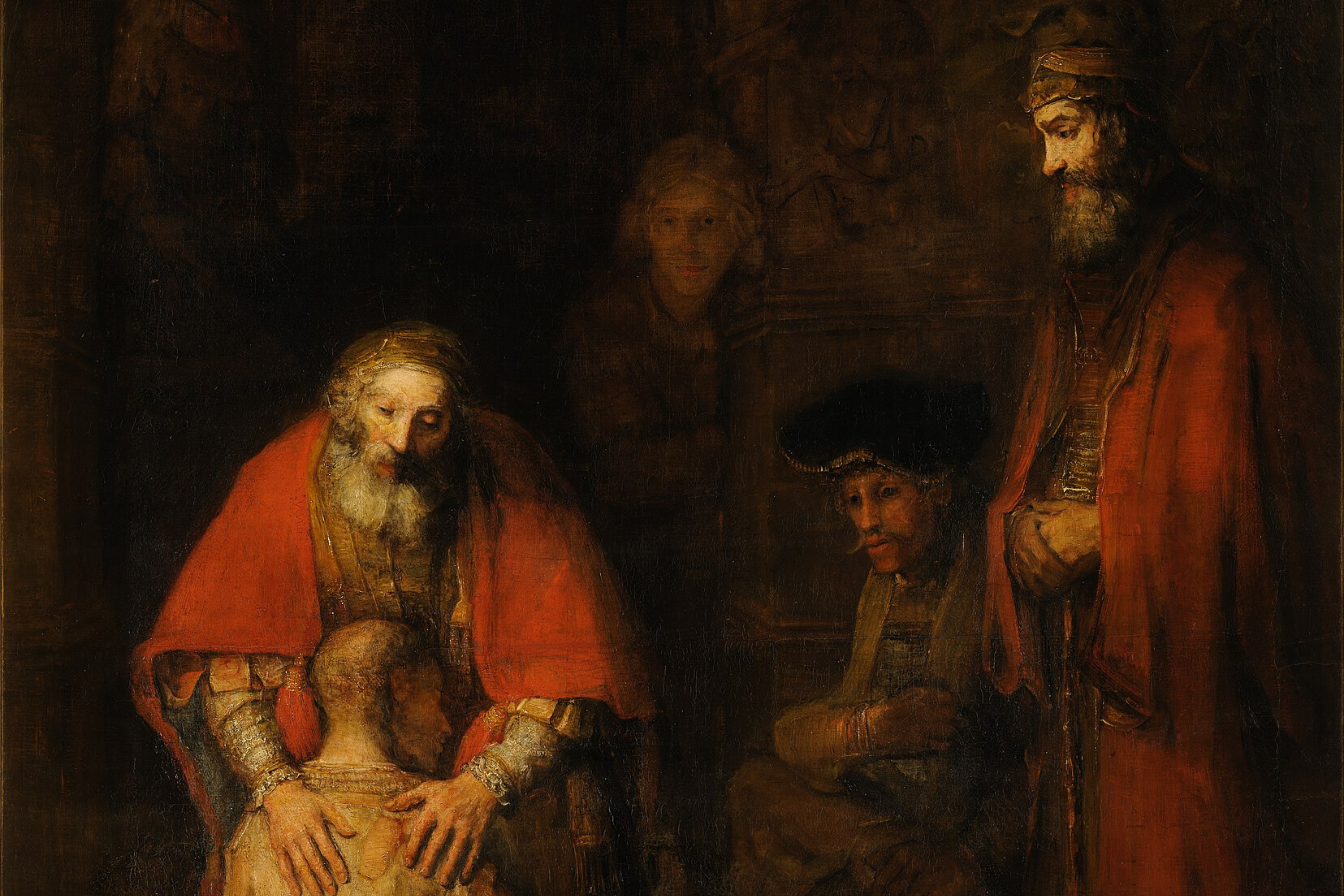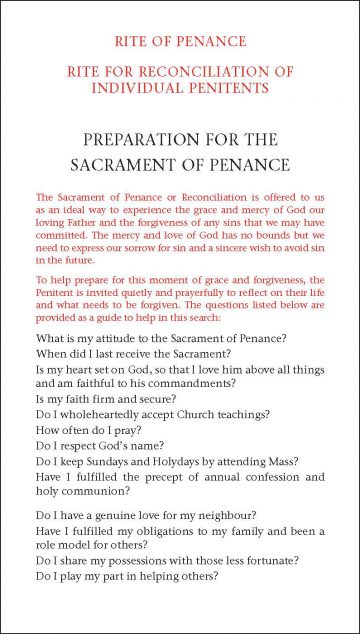Have you ever wondered why you need to go to confession, or why you can’t just confess your sins directly to God without needing to confess to a priest? Here are answers to some of the most common questions about the Sacrament of Penance, as extracted from The Beauty of Confession with Pope Francis by Fr Donncha Ó hAodha:
Why do I need to ask for forgiveness, can’t God just forgive me?
The Lord’s mercy is inexhaustible, for those who seek forgiveness. God respects our freedom; we must freely ask for his pardon of our sins. “God who created you without you, will not save you without you”, says St Augustine. Divine grace and human freedom work together for the salvation of our souls. God the Father “doesn’t just leave the door open to us, but he awaits us”, says Pope Francis. “He is engaged in waiting for his children”. It is up to us to decide to enter the door of God’s mercy.
Why do I need confession?
We are called, each and every one of us, to be saints. In baptism we receive the new life of God, the life of holiness, symbolised in the white baptismal garment. However, due to the weakness of our fallen nature we are prone to sin and indeed we do fall along our journey towards heaven. This is why the Holy Father teaches that “conversion is not the question of a moment or a time of the year, it is an undertaking that lasts one’s entire lifetime”. Indeed, “this is our life: to rise again continuously and resume our journey”.
Does going to confession improve my relationship with God?
The Sacrament of Reconciliation is immensely fruitful since it gives us the opportunity to say sorry to God who has given us everything and proven his love in a supreme way on the cross. “God has shown his love for us in that while we were yet sinners Christ died for us” (Rm 5:8). We know how important it is for us in human relationships to be able to say sorry to those we have hurt or wronged in any way. The closer the person is to us, a parent, a sibling, a dear friend, the deeper our sorrow. In order to express our sorrow to our most loving friend of all, Jesus Christ, and to receive his forgiveness, we have the sacrament of confession.
What should I do if I find it hard to go to confession?
When we find it hard to go to confession, we do well to ask the Lord for the grace we need to approach this sacrament. In a special way, we might appeal to Mary, the Mother of Mercy, to lead us to her Son, to encourage us, as she did at Cana, to do whatever he tells us (cf. Jn 2:5).
When going to confession, do I need to be truly sorry for my sins?
The Catechism of the Catholic Church clearly explains the three “acts of the penitent”, namely contrition, the confession of sins, and satisfaction (nn. 1450-1459). Among the penitent’s acts, “contrition” or sorrow for sin occupies the first place. This contrition is called “perfect” if it arises from a love by which God is loved above all else, and “imperfect” (also called “attrition”) if it arises from the consideration of sin’s ugliness or the fear of eternal damnation and the other penalties threatening the sinner (contrition of fear). While we should aim to love God above all else and hence have perfect contrition, imperfect contrition is also a gift from God and is brought to completion by sacramental absolution in confession. Indeed the fact of approaching the sacrament of penance is already an expression of sorrow for sin. Our sorrow for sin includes “purpose of amendment” or the resolution not to sin again. This often has very practical implications such as the avoidance of “occasions of sin”, namely places or situations that tend to lead to sin.
Are there some sins too big, or which happen too frequently, for God to forgive?
At times some people may consider that their particular sins cannot be forgiven, perhaps because they seem too serious and beyond pardon, or perhaps because of having been away from confession for a long time. As Pope Francis says:
“No one can be excluded from the mercy of God… With how much love Jesus looks at us! With how much love he heals our sinful heart! Our sins never scare him. Let us consider the prodigal son who, when he decided to return to his father, considers making a speech, but the father doesn’t let him speak. He embraces him (cf. Lk 15:17-24). This is the way Jesus is with us. ‘Father, I have so many sins…’ – ‘But he will be glad if you go: he will embrace you with such love! Don’t be afraid’… Do not forget that God forgives all, and forgives always. Let us never tire of asking forgiveness.”
Why do I need to go to confession to a priest? Can’t I confess them privately in my heart?
“First”, as Pope Francis explains, “the forgiveness of our sins is not something we can give ourselves. I cannot say: I forgive my sins. Forgiveness is asked for, is asked of another, and in confession we ask for forgiveness from Jesus. Forgiveness is not the fruit of our own efforts but rather a gift”.
Secondly, as we saw in Chapter Twenty of St John’s Gospel, the risen Lord entrusted the mission and power to forgive sins to priests within his Church. The Church is the place where Christ continues his work of salvation here and now through the power of the Holy Spirit.
Moreover sins, even the most hidden ones, have an impact on others, especially on our brothers and sisters in the faith. An offence against God is also an offence against his people, and that is why pardon must be sought of the Church in the person of the priest, a sacred minister of the Church. As Pope Francis says: “God forgives every penitent sinner, personally, but the Christian is tied to Christ, and Christ is united to the Church”.
Are there any human benefits to going to confession to a priest?
Confessing to a priest is helpful psychologically and emotionally to be able to unburden ourselves. Moreover, the words of absolution which we hear in confession provide an external assurance of forgiveness which is very important for our inner peace.
Why do I have to perform penance after confession?
Pope Francis says: “God goes beyond justice with his mercy and forgiveness. Yet this does not mean that justice should be devalued or rendered superfluous. On the contrary: anyone who makes a mistake must pay the price”. Making reparation is not a question of trying to satisfy an implacable God, but rather a requirement of justice, of love of God and of our human nature. As the Pope told a large gathering of priests: “Mercy…does not exclude but rather includes the just obligation to atone for, to the extent possible, the wrong committed”.
What are the benefits of going to confession frequently?
This sacrament is a source of immense grace, ongoing purification and increasing intimacy with God. Not only are our sins forgiven but we receive the spiritual strength we need to keep up the Christian battle by growing in the virtues.
What if I keep committing the same sins?
We may sometimes be bothered by the thought that our sins are always the same. Benedict XVI addressed this concern very effectively in a catechesis to thousands of First Holy Communion children:
“It is very helpful to confess with a certain regularity. It is true: our sins are always the same, but we clean our homes, our rooms, at least once a week, even if the dirt is always the same; in order to live in cleanliness, in order to start again. Otherwise, the dirt might not be seen but it builds up. Something similar can be said about the soul, for me myself: if I never go to confession, my soul is neglected and in the end I am always pleased with myself and no longer understand that I must work hard to improve, that I must make progress. And this cleansing of the soul which Jesus gives us in the sacrament of confession helps us to make our consciences more alert, more open, and hence, it also helps us to mature spiritually and as human person… It is very helpful to confess regularly in order to foster the cleanliness and beauty of the soul and to mature day by day in life.“






